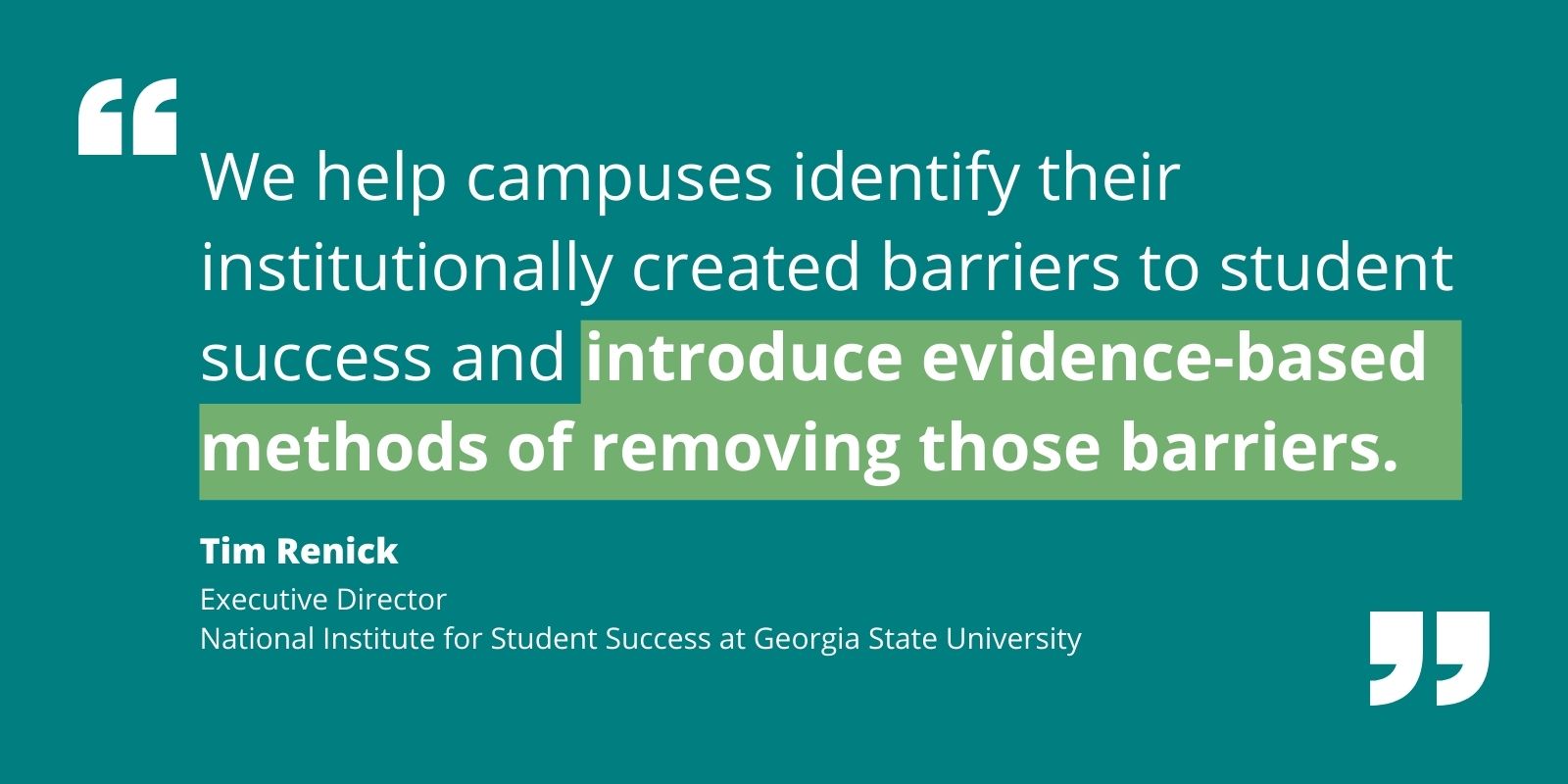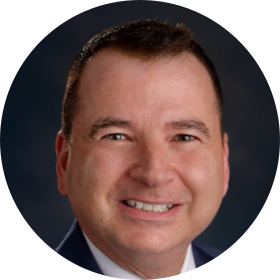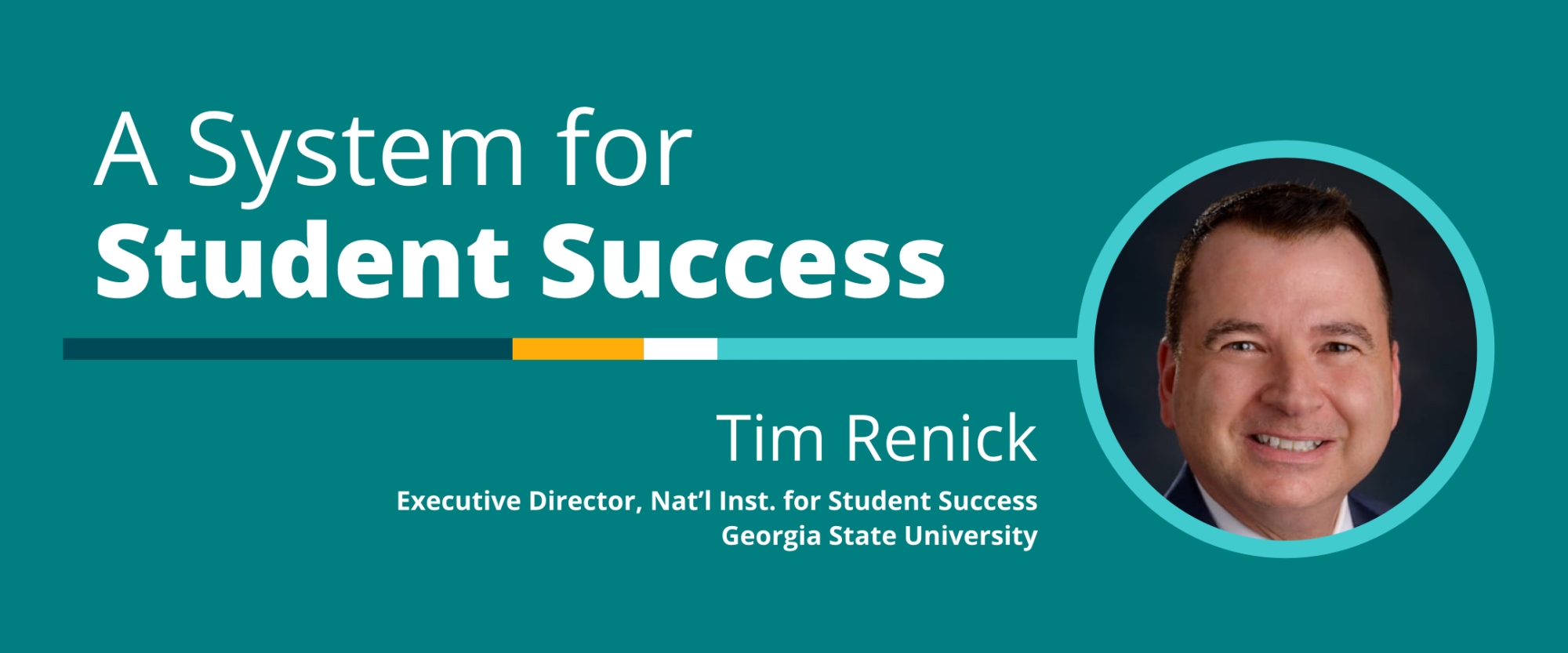Note: This interview in the Weekly Wisdom Series originally aired on June 10, 2021 as part of the University Innovation Alliance’s Innovating Together Podcast, appearing live on Facebook, Twitter, and LinkedIn.
At the University Innovation Alliance (UIA), we recently began our second year of the Innovating Together Podcast, created in partnership with Inside Higher Ed. I'm the UIA's Executive Director, and my co-host is Doug Lederman, Editor and Co-Founder of Inside Higher Ed. For the 6/10/21 episode of Innovating Together's Weekly Wisdom Series, we spoke with Dr. Tim Renick, Executive Director of National Institute for Student Success at Georgia State University. This is a newly created institution in the emerging field of student success, and Dr. Renick generously shared his wisdom about what the term "student success" means from an administrative standpoint, using data to determine and implement best practices, and why he might be the most qualified person to lead the way.
A Method for Student Success
We asked Dr. Renick what the National Institute for Student Success does and how he came to lead it.
"For five, six years, we had a steady stream of campuses come to visit Georgia State, often for a single day," he explained. "We would do talks and take them through our advising center and connect them with our data teams and so forth. But there was always the request for more. Inevitably, you want to go back to your home campus and implement, and we never had the bandwidth to help campuses through that process. The National Institute for Student Success is going to fill that need. We will help campuses identify their own institutionally created barriers to student success and introduce evidence-based methods of removing those barriers. We already have some partner campuses we'll be working with, end of summer and into fall. We think it's a way to make sure that these good, commonsensical approaches become the norm rather than the exception in higher ed."

As to why he was the best person to lead this effort, Dr. Renick admitted, "I have had the opportunity to become a university president a couple times in the last few years, and I turned down that opportunity because I thought that I could make more of a difference in my current role. One reason we have had now about 500 campuses come to look at our student success programs is there's not that much information out there about how you actually implement large-scale, data-based interventions to support students. That's a rare if not unique skill set, whereas, if I were to assume the presidency, I'd be doing that maybe five percent of my time. This is where I can make a difference, and my voice will probably be louder as a national representative of student success approaches than as another president among hundreds."
A Wakeup Call
With the COVID-19 pandemic framing everyone's thinking over the past year, Dr. Renick presented it as a way of looking at how institutions could help students succeed.
"The pandemic underlines the importance of developing personalized student support systems that don't require students asking for these services," he said. "In a nutshell, that's what Georgia State has done over the last decade, with our predictive analytics, proactive advising, and chat bots. We have given out over 20,000 proactive micro grants, no application required. We can't expect students, especially from low-income, first-generation backgrounds, to master the academic skills required to get a bachelors degree and, at the same time, figure out this insane bureaucracy that we have created in higher education. Georgia State has tried to take the burden off of students. We don't make the courses any less rigorous than they were before, but let's make the figuring out how to do college a lot less complicated. I think the last 12 months have shown how important that is."
Dr. Renick gave us this example: "Last April, when we got our CARES Act money and were instructed to deliver half to the students directly, we set up two means for the students to access that money. We set up an application, like every college and university. And over the last 12, 14 months, we've had about 6,000 students that have availed themselves of that. The other thing we did is use our existing systems, the same systems we used to give micro grants to students at risk of dropping out, with no application required – students with holds on their accounts, with high balances, high levels of unmet need. They don't need to tell us they have financial need. We see they have financial need. And we just put the federal money directly in their accounts. We've done that over 60,000 times in the last 14 months. So by a ratio of 10 to 1, you know, we've distributed the money proactively, as opposed to waiting for the students to fill out some bureaucratic form and go through yet another hurdle. The students with the bandwidth to overcome bureaucratic hurdles are better positioned than those who could never even conceive of filling out an emergency aid form or even know that that money is available".
He emphasized the importance of these systems, telling us, "The campuses that have invested, historically, in those kind of approaches were the campuses that weathered the pandemic better, but also the campuses that are going to be much, much stronger as we work our way out of the pandemic – and as we recognize that more and more higher ed students are parents, adult learners, part time, low-income, and so forth. These are the kind of approaches that these students need in order to succeed."
A Strategy of Patience
Dr. Renick believes it's necessary to understand that systemic long-term results are often incremental. "Student success is not finding something that turns a switch 35 percent graduation rates to 100 percent," he reminded us. "What we're doing on a day-to-day basis is trying lots of different things, some of which may be successful, others of which will be entire failures. You need to recognize that a certain proportion of the efforts that you engage in will bring back these returns. That expectation enabled me to go through a lot of things that haven't been successful and find the things that really do work out and produce great results. Being at a place like Georgia State with 50,000 students, of which 80 percent have immense needs – academic, financial, emotional, so forth – it can be overwhelming, because there is so much deserving attention that the students need. But if we can plug away and do things every day that make life a little better for some students, then over time, you begin to see those results in a very gratifying sort of way. Georgia State is now graduating 3,500 more students every year than we were just ten years ago. None of that data analysis or these pilots resulted in more than a few dozen additional graduates here or maybe a dozen there. But you do that day after day and year after year, and a decade later, it's 3,500 more students every year graduating with their degrees. So that explains why I am willing to keep plugging away even when not every day is a success."
An Ethical Perspective
Growing up in a military family and supporting his education through work-study programs, Dr. Renick understands service and hard work. Georgia State hired him as a junior faculty member, assigning him to start a religious studies department. While nurturing his fascination for and facility with academic data, this experience gave him the perspective to make a compelling ethical case.
"My subfield is actually religious ethics," he explained. "And what I think I have done more intentionally and maybe more overtly than a lot of other people who speak in academia is make the moral argument. Many people are attracted to higher education because of the moral mission. People come to Georgia State to make a difference, especially with low-income students and students of color and first-generation students. So be out there and say: 'Yes, what we are doing is the morally right thing to do, and if we don't do this, if we allow students to come to our campuses and drop out with debt and nothing to show for it, that's wrong. That's immoral.' I think what is underestimated, when speaking to a group of colleagues in higher education, is that most people could have done other things, and they chose higher education because they believe in its moral mission. So make the moral arguments, and show why what you are doing is the morally appropriate thing to do."
Wisdom Received and Given
We concluded our conversation by asking Dr. Renick the best advice he ever received and the advice that he shares most frequently with up-and-coming leaders.
"Everyone who you network with is a future ally," he stated. "Don't burn bridges. Whenever possible, build strong relationships. Agree to do things even if you don't immediately see the personal benefit, because those relationships pay off in the end. I think my career is testimony to that. So that would be the advice that I got, and maybe it's the advice I give as well. But the other advice I give is that there's a whole realm of opportunity for career development in the field of student success. The term 'student success' didn't really exist a decade ago, so these efforts and programs are a very new enterprise. I encourage people to take that seriously, because I think this is definitely the direction the higher ed is heading."
Links Mentioned in This Episode
• National Institute for Student Success at Georgia State University
• Georgia State University
• Micro grants (financial aid for student retention, as explained in "Colleges offer micro grants to get cash-strapped students across finish line," EdSource 2/25/18)
• CARES Act (Coronavirus Aid, Relief, and Economic Security Act, passed 3/27/20 by the U.S. Congress)
Bios of Guest and Co-Hosts

Guest: Tim Renick, Executive Director, National Institute for Student Success (NISS) at Georgia State University
Dr. Tim Renick, who has led Georgia State University’s student success efforts since 2008, is the founding executive director of Georgia State’s National Institute for Student Success, and Professor of Religious Studies at Georgia State. Previously, he served as Georgia State's Senior Vice President for Student Success, Chair of the Department of Religious Studies, and Director of the Honors Program. Between 2008 and 2020, he directed the university's student success efforts, overseeing one of America's fastest improving graduation rates and the elimination of all equity gaps based on students' race, ethnicity or income level. Dr. Renick has testified before the U.S. Senate on strategies for helping low-income university students succeed and has twice been invited to speak at the White House. His work has been covered by the New York Times, the Wall Street Journal, Time, and CNN and cited by former President Barack Obama. He was named one the 16 Most Innovative People in Higher Education by Washington Monthly, and received the Award for National Leadership in Student Success and the McGraw Prize in Higher Education. He has served as principal investigator for more than $30 million in federal and private research grants in student success. A summa cum laude graduate of Dartmouth College, Dr. Renick holds his M.A. and Ph.D. in Religion from Princeton University.

Co-Host: Bridget Burns, Executive Director, University Innovation Alliance
Dr. Bridget Burns is the founding Executive Director of the University Innovation Alliance (UIA). For the past decade, she has advised university presidents, system chancellors, and state and federal policy leaders on strategies to expand access to higher education, address costs, and promote completion for students of all backgrounds. The UIA was developed during Bridget’s tenure as an American Council on Education (A.C.E.) Fellowship at Arizona State University. She held multiple roles within the Oregon University System, including serving as Chief of Staff and Senior Policy Advisor, where she won the national award for innovation in higher education government relations. She was a National Associate for the National Center for Public Policy and Higher Education, and has served on several statewide governing boards including ones governing higher education institutions, financial aid policy, and policy areas impacting children and families.

Co-Host: Doug Lederman, Editor and Co-Founder, Inside Higher Ed
Doug Lederman is editor and co-founder of Inside Higher Ed. With Scott Jaschik, he leads the site's editorial operations, overseeing news content, opinion pieces, career advice, blogs and other features. Doug speaks widely about higher education, including on C-Span and National Public Radio and at meetings and on campuses around the country. His work has appeared in The New York Times and USA Today, among other publications. Doug was managing editor of The Chronicle of Higher Education from 1999 to 2003, after working at The Chronicle since 1986 in a variety of roles. He has won three National Awards for Education Reporting from the Education Writers Association, including one for a 2009 series of Inside Higher Ed articles on college rankings. He began his career as a news clerk at The New York Times. He grew up in Shaker Heights, Ohio, and graduated in 1984 from Princeton University. Doug and his wife, Kate Scharff, live in Bethesda, MD.
About Weekly Wisdom
Weekly Wisdom is an event series that happens live on Facebook, Twitter, and LinkedIn. It also becomes a podcast episode. Every week, we join forces with Inside Higher Ed and talk with a sitting college president or chancellor about how they're specifically navigating the challenges of this moment. These conversations will be filled with practicable things you can do right now by unpacking how and why college leaders are making decisions within higher education. Hopefully, these episodes will also leave you with a sense of optimism and a bit of inspiration.
Rate, Review & Subscribe
Learn why hundreds of people have rated this new podcast 5 stars! Please join others and rate and review this podcast. This helps us reach and inform more people -- like you -- to help increase the number and diversity of college graduates in the United States.
Click here, scroll to the bottom, tap to rate with five stars, and select “Write a Review.” Then be sure to let us know what you loved most about the episode! Also, if you haven’t done so already, subscribe to the podcast. We’ll be adding a bunch of bonus episodes to the feed and, if you’re not subscribed, there’s a good chance you’ll miss out.

